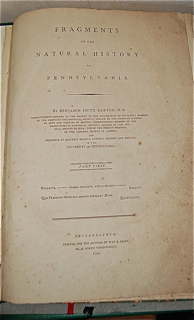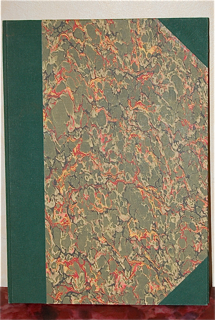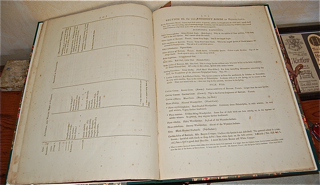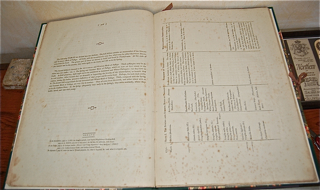Barton, Benjamin Smith
Fragments of the Natural History of Pennsylvania, Part First
back
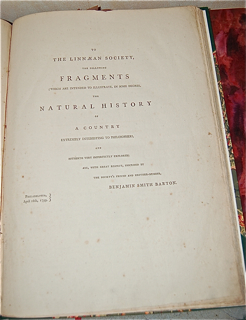
|
Seller ID: 767 Philadelphia: printed for the Author by Way & Groff, 1799. First edition (xviii, 24). Folio, in modern green cloth and marbled paper, gilt title to spine. Right margin of title page moderately toned, a few spots in the texts, a single perforated library stamp at the top corner of the first page of the Introduction. Benjamin Smith Barton, M.D., (1766- 1815) was professor variously of materia medica, natural history, and botany at the University of Pennsylvania and a member of the Linnaeen Society, the American Philosophical Society, and the Society of Antiquaries of Scotland, among others. Barton's principal work is Elements of Botany (1804), the first botany text published in the U.S. His wide ranging interests in natural history led him to publish a number of monographs and studies, e.g., 'The Fascinating Quality Ascribed to the Rattlesnake' (1796) and 'New Views of the Origins of Tribes in the United States' (1797). Barton acted as advisor on botanical collections to Lewis and Clark and was acquainted with Thomas Jefferson and William Bartram. His nephew William P.C. Barton (1786- 1856) was the author of the important A Flora of North America (1821-1823). Fragments of the Natural History of Pennsylvania was 'intended to illustrate... the Natural History of a Country extremely interesting to philosophers and hitherto very imperfectly explored.' These fragments, not quite twenty-five pages of field observations, together with introductory speculations about such matters as the range of the Carolina Parrot and the 'conformity between the vegetation of some plants and the arrival of certain birds of passage' suggest a systematic natural history based on local observation, rather like the Christmas bird count. On the other hand, certain passages in Fragments preserve a reliance on classical authority so that natural history is conducted as a literary, historical study of the texts of ancient received opinion, as in this curious note on the origins of bees and the procurement of honey: "It appears to have been a very general opinion among the ancients, that bees were produced from the putrid bodies of animals.... The Greeks believed, that these animals arose from putrid bullocks.... So rude were the opinions of the ancients respecting the origin of these insects. It is certain, however, that [according to accounts in the Old Testament and in Virgil's Georgics] putrid carcases are often visited by bees, and it is not unlikely that from these carcases, they may be able to procure honey" (xi). Absent close observation of bees and carcases, certain 'rude opinions' persist here, side by side with field observations. A handsomely bound copy of a scarce early work on American natural history. Price: $3000.00
For more information or to place your order, you can email us at info@trilliumbooks.ca, telephone us at 705-749-0461, |

